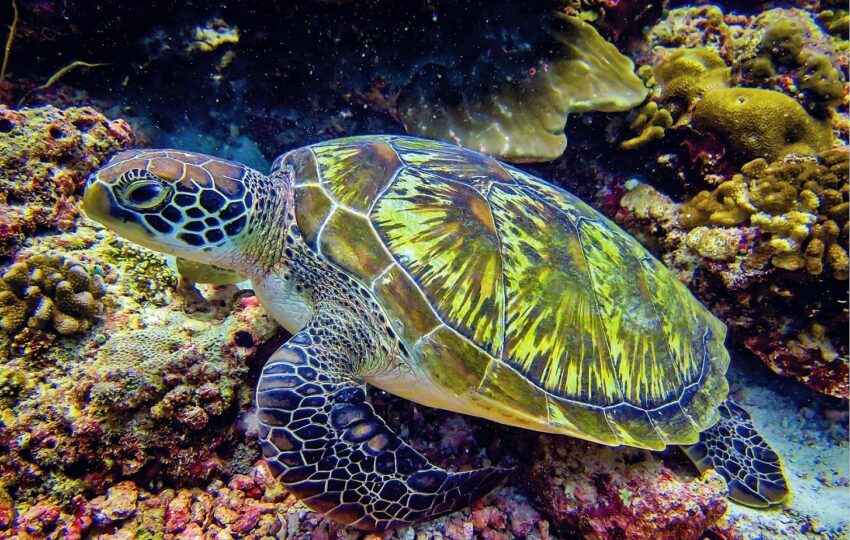WHY YOU SHOULD LOOK BUT NOT TOUCH MARINE LIFE IN THE MALDIVES

As a Responsibletravel.com member and with a team who have a passion for our marine environment, we get angry and upset when we see images taken in the Maldives where marine life is being held, poked and prodded for no other reason than to create a ‘selfie’. We do not condone this irresponsible behaviour and we hope that by educating our guests on how to snorkel and dive responsibly good behaviour will breed good behaviour.
There are many reasons as to why divers and snorkelers should only LOOK BUT DON’T TOUCH. In the case of this turtle it would not know what a scuba diver is and probably assumed it was a shark attempting to eat it. The turtle would be doing everything possible to escape and hide. Turtles breathe air, they swim to the surface of the ocean to breathe and use a breath-hold technique to eat and also to escape from danger. Holding a turtle that has been underwater holding it’s breath is highly likely to give it a heart attack and it’s chances of drowning are increased.
The preferred method of defense for most marine life being touched or attacked is to swim away, however, if an aggressor is persistent marine life will retaliate. Some will bite, some will sting and some will segrate a poison. Hence the easy phrase to remember LOOK BUT DON’T TOUCH.
Contrary to popular belief, marine life doesn’t go about looking for swimmers, surfers, snorkelers and divers to attack. Generally theses creatures are looking for food and if they do bite it’s because it has either mistaken you for a tasty meal or you have put your finger or hand somewhere it shouldn’t be, most probably in the entrance to it’s home!
Without defense mechanisms maldives marine life would end up being dinner for a larger marine creature. It is not always apparent what the defense mechanism may be and that is another reason why you should LOOK BUT DON’T TOUCH.
Sea Urchins have spines which are pretty obvious but there are many fish who have them too. Most spines are found on a fish’s fins where they are erected when necessary. They are sharp, hard and will not be nice to hold and could potentially bring your underwater encounter to a painful end.
Not only do the Stonefish and Scorpionfish possess poison loaded fin spines which can result in fatal injuries on anything attempting to touch or eat them, they are also the masters of disguise keeping themselves well camouflaged within their environment.
A further reason to LOOK BUT DON’T TOUCH is that by touching coral and marine life it is very likely that YOU will pass on germs and bacteria. At the very least you will remove the anti bacterial mucous skin cover that fights infections, keeps out parasites and keeps marine life fit and healthy. What may seem like a small insignificant action can ultimately result in the suffering of a creature and ultimately death as it’s system is weakened by disease.
LOOK BUT DON’T TOUCH applies regardless of the size of creature, even if marine life appears inquisitive. For example in the Maldives manta rays may approach seemingly enjoying the tactile stimulation provided by human contact as well as the bubbles from divers breathing apparatus. Touching a manta ray, even if they present their bellies for a rub, will remove some of the mucus described above. Our advice, keep low to the reefs of maldives or as a snorkeler remain on the surface and just watch these beautiful creatures as they perform a graceful underwater ballet.
It’s not just the marine life that has fins and tails where the LOOK BUT DON’T TOUCH rule applies. Coral is actually a fragile living animal and when you touch it with your fins or hands you kill it. Not only can you break it or crush it, you can poison it. The results of touching may not appear for weeks to months but are evident for years and years to come.
If you are planning a trip to the Maldives make the commitment to observe responsible snorkeling and diving practises https://www.diveagainstdebris.org/
LOOK BUT DON’T TOUCH, ask for photos that include marine life without touching. If you work in the Maldives avoid feeding, touching, or handling marine life. You may think guests will be impressed by you handling a sea creature but they will admire you more if you show our marine life and environment the respect it deserves.
Still not convinced about the LOOK BUT DON’T TOUCH approach? Well how about one of the team drop by your home uninvited, maul and grope you, stress you out and then drop you far from home??
As a sustainable travel company, at Secret Paradise we prioritize responsibility and actively promote ethical behavior among travelers. When embarking on one of our snorkeling or diving tours, our guides not only act responsibly but also provide insightful advice and guidance, ensuring that your experience is not only memorable but aligns with our commitment to sustainable and responsible tourism practices.



